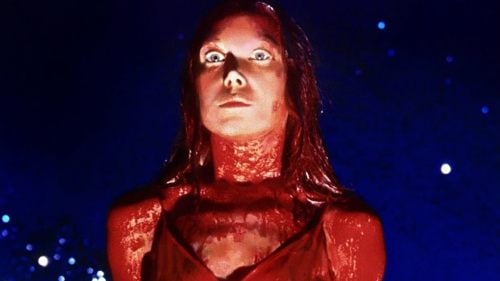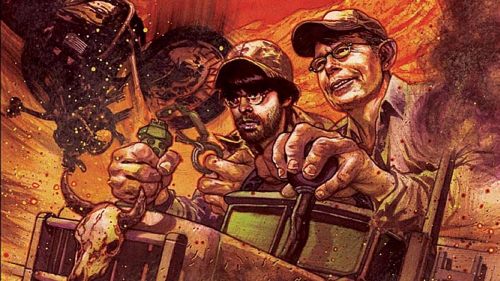SILVER BULLET: Growing Up In Stephen King’s Werewolf, USA
IT is in theaters this week. Get your tickets here!
For folks of a certain generation, Silver Bullet (’85) is a coming of age staple. The movie played in regular rotation on public access’ Sunday matinees, from which hand-labeled VHS tapes were made, so that kids could fast forward through the commercials and get to the solid werewolf action. The lone feature film on the CV of brilliant TV director Daniel Attias (who’s helmed installments of almost every classic HBO series, from Deadwood to The Wire), Silver Bullet is one of the most perfect Stephen King adaptations – goofy, corny, and showcasing a hairy, rubbery monster that’s never scary, but will still knock your head clean off. It was a motion picture made for lazy afternoons when you didn’t want to go outside and play with your friends; an indoctrinating rite into your own personal Losers’ Club.
Narrated with wistful nostalgia by Jane Coslaw (Tovah Feldshuh, boiling the “big sister” archetype down to its elemental core with only a voice over), we open in Spring, 1976 as Jay Chattaway’s soapy synth score welcomes us to the town of Tarker’s Mills, another blue collar King stomping ground. It’s here that the Mills’ “long nightmare began”. With a roar and a howl, town drunk Arnie Westrum (James Gammon) is decapitated by an oversized paw. The death is chalked up to being accidental, as the lush would often drink himself to sleep on the train tracks. But we know there’s nothing normal about Arnie’s demise. The brutal murders have commenced, and will continue every time a full moon rises.
Marty (Corey Haim) is the “cross” Jane (played in flashback by Megan Follows) has to bear. A paraplegic in a motorized wheelchair, Jane and Marty share a bond only an annoying kid brother and his watchful bigger sister can. Marty’s kind of a jerk – playing pranks on the girl and her friends with his buddy Brady (Joe Wright), while their mom (Robin Groves) sticks up for him (in Jane’s mind) “because he’s crippled.” Yet Marty genuinely feels bad whenever he dirties one of her dresses or embarrasses Jane in front of a cute boy she’s crushing on. He may be a “booger”, but Marty definitely recognizes that Jane’s all he’s got in this world. The relationship between the two siblings is textbook King – silly, somewhat problematic, but deeply felt to its core. It's during the scenes where Marty sneaks into his sister’s room in the middle of the night to slip her money for a new pair of pantyhose that Chattaway’s score hits saccharine piano highs, and that’s okay. Attias’ movie is pushing Movie of the Week buttons with startling proficiency, wrapping us up in this melodramatic anti-reality.
The book Silver Bullet was based on – King’s ’83 collaboration with Swamp Thing co-creator Bernie Wrightson, Cycle of the Werewolf – presented each werewolf attack as its own, graphically illustrated calendar vignette within the already short story. Attias brings these brutal spasms of violence to life with the aid of Italian creature FX maestro Carlo Rambaldi. The werewolf suit itself is bulky and somewhat distracting, but the carnage actually hurts every time the beast’s claws are bared. Silver Bullet discovers the perfect middle ground between soft focus sappiness and Fangoria-ready freak show. Layers of prosthetics are layered onto the wolf’s victims; Karo syrup spraying into the air when jugulars are cut and limbs are torn from fragile forms. Attias has a knack for delivering exactly what horror fans desire out of their low level King adaptations, and his movie is thrilling in an old school creature feature fashion.
Perhaps even more impressive is the way Attias (along with Italian exploitation cinematography stalwart Armando Nannuzzi* [Wake Up and Die (’66)]) brings Tarker’s Mills to life. Each daylight scene is awash in sunny texture, while the night gives way to hazy plumes of fog, through which the werewolf stalks its prey. The interior of the town watering hole is wood paneled and lined with neon “Beer” signs, feeling undeniably familiar to anyone who grew up in a working class borough. The characters who populate these places are even more colorfully drawn – ranging from surly bartenders (Lawrence Tierney), to dogged cops (Terry O’Quinn), to a scary one-eyed Reverend Lowe (Everett McGill), who may not be as wholesome as he seems. It certainly helps that King penned the screenplay for this particular foray into his unique universe, and his signature stamp is felt all over the character and world building. When the men of Tarker’s Mills decide to take the law into their own hands once they get tired of waiting around for the deputies to do anything, their “private justice” ends tragically for a few of their own (via a wolf-wielded Louisville Slugger).
Best of all is Gary Busey, who plays the kids’ drunken, divorced Uncle Red. Taking Marty under his wing might be the only thing Red’s ever done right in his life, and his ability to see the boy as more than just a “cripple” carries legitimate emotional weight. Doubting Marty’s wild cries of “werewolf” before teaming up and helping him hunt the monster down, Busey reminds you what a great genre movie presence he was before that unfortunate accident robbed him of his cognizance. Uncle Red is the light yin to Reverand Lowe’s dark yang, rising up through the blackness with Marty on his shoulders, looking to rid their town of such a terrifying evil. When he builds the boy his motorbike wheelchair replacement (from which the movie takes its name), it’s a classic bit of charming King ridiculousness.
Silver Bullet peaks around the halfway point, with a nightmare in which the town’s entire population transforms into fanged animals amongst the Reverend’s pews. It’s a dynamo old school SFX sequence, as air bladders bulge, and hair sprouts from places it shouldn’t; civilized clothes giving way to primal beings beneath. Though it may ostensibly appear to be nothing more than a show stopping “blink and you might miss it” dream sequence, the set piece also encompasses the movie’s themes in succinct B-Movie fashion. Silver Bullet is all about the act of growing up, and not letting afflictions cripple our spirits completely. We may not turn into werewolves, but desperation and despair can make monsters of us all, if we resign and let it happen. Attias’ movie is often viewed as a cheapie VHS classic, cashing in on the author’s work during the height of his popularity. But in its heart, Silver Bullet is a film that’s all about easing into adulthood, without letting malicious influence taint our soaring souls.
*Who also shot Maximum Overdrive (’86), King’s infamous lone directorial effort.



